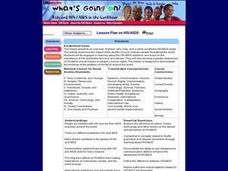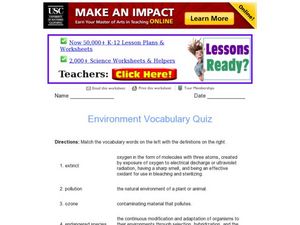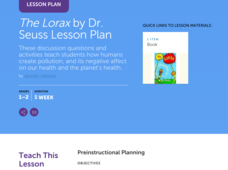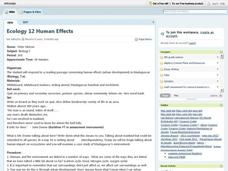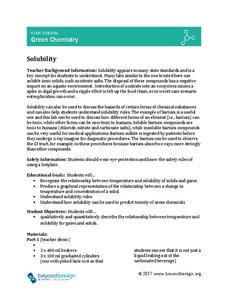Curated OER
Is Environmental Health a Basic Human Right?
Young scholars examine basic human rights as defined by the United Nations. They develop a list of rights by class consensus, read an article, answer discussion questions, and complete a worksheet.
Advocates for Human Rights
The Right to a Clean Environment: Right to a Clean Environment Role-Play
A lesson challenges scholars to think critically about the world in which they live. Learners begin by role-playing a character, answering questions, and taking part in a whole-class discussion. They then brainstorm ways they can help...
American Museum of Natural History
Ask a Scientist About Our Environment
Let's ask an expert! Scientists at the American Museum of Natural History field questions about the environment in an interactive resource. Question topics range from global warming and conservation to endangered species and habitats.
Advocates for Human Rights
The Right to a Clean Environment in the United States
Even if a school has gone digital, chances are there's still plenty of paper being used. The three activities help scholars learn about the environmental impact of paper and another consumer products of their choosing, the issue of...
WolfQuest
The Return of Gray Wolves to Yellowstone National Park: Right or Wrong?
Should gray wolves be removed from Yellowstone National Park? After researching the complex relationships between the various habitats and species at Yellowstone National Park, including humans, class members take a position on the...
Curated OER
Lesson Plan on HIV/AIDS
Students examine where, why, how and in what conditions HIV/AIDS exists. They examine the deadly impact this virus has had on the world and look at how to prevent the spread at home. The students also develop a greater awareness of the...
Curated OER
Mystery, Myth, and Wonder: The White Elephant
Learners examine the role of the elephant in the culture of Thailand through many different class activities based on a PBS program "The White Elephants of Thailand with Meg Ryan". Students also look at the impact of technology on...
Curated OER
Human Cloning, Genetic Engineering and Privacy
Review the aspects of human cloning and the moral issues associated with it. Individually, your students will keep a list of the articles related to this issue and research issues related to the ethic issues people are concerned with....
American Museum of Natural History
Ask a Scientist About Our Environment
Scientists respond to 26 question posed by learners. These experts answer in easy to understand language, include photos to illustrate the issue, offer suggestions for how young people can make a difference, and supply links to resources...
Curated OER
Adaptations of Fishes for Survival in Polar Environments
Students compare the anatomy of temperature and polar fishes. They explore the adverse effects of cold on metabolism and physiology and discuss how polar fishes adapt to their environments. Comparisons are also made to the DNA sequences...
Curated OER
Teaching Animal Rights
In this biology worksheet, students engage in the reading of the rights of educators to teach concerning the issue of using animals for educational purposes.
National Geographic
Spot Where You DON'T Get Your Seafood
When your class is examining the fishing industry or sustainable practices, you can use this brief activity to demonstrate the global impact our food choices have. Overharvesting, overfishing, and bycatch are important topics to address...
Curated OER
Environment Vocabulary Quiz
In this environment vocabulary worksheet, students draw lines to match 13 words to their definitions in another column. Words pertain to the environment. Examples: biosphere, habitat, greenhouse effect, smog.
Curated OER
An Exploration of Cradle-to-Cradle Design Thinking
Introduce cradle-to-cradle design thinking. Scholars first discuss the importance of natural laws and rights. They then use a variety of online and print resources to research eco-efficiency and cradle-to-cradle design.
Scholastic
The Lorax by Dr. Seuss Lesson Plan
Celebrate the whimsical world of Dr. Seuss with a lesson that features the memorable tale of The Lorax. After listening to a riveting read-aloud, scholars take part in a grand conversation about the story and environment. Then they...
Curated OER
Ecology 12 Human Effects
Learners are able to respond to a reading passage concerning human effects (under development) in Madagascar. They have a quiz on primary and secondary succesion as their bell ringer. Students write an essay on the topic "No man is an...
Curated OER
E. coli and Their Human Environment
Students are able to observe how environmental changes (antibiotics) affect the growth of E. coli. They are able to use the "F" test for statistical analysis. Students can explain that E. coli is a common rod-shaped intestinal...
Curated OER
How Do People Change the Environment?
In this environmental changes worksheet, students will read statements about things people do. Then students will fill in the blank of 4 statements that describe the effect those actions have on changing the environment.
Advocates for Human Rights
The Right to a Clean Environment: Water
First, young citizens learn about water consumption by doing some research themselves on their home water usage and sharing their findings with the class. Then, they do some brainstorming and devise a plan to reduce water consumption.
Pulitzer Center
The Global Water Crisis
High schoolers examine the "quiet crisis," the lack of clean water, by reading articles and viewing video clips. They discuss the situations in Ethiopia, Yemen, Kenya, and Nepal. There are two options for the lesson, but one of them...
SRI International
The Water Crisis
Water, water, everywhere, right? Wrong. Learners assess their own knowledge of water availability on Earth. Then, through a reading, a teacher-led presentation, and an activity, pupils learn about the importance of available clean...
College Board
2003 AP® Environmental Science Free-Response Questions
One size fits all doesn't seem to be the right approach to endangered species. Using a four-part AP® assessment, learners respond to questions that address environmental concerns such as human population changes, invasive species...
Baylor College
A Place to Be
Home sweet home. Humans, birds, beavers, ants, we all need a place place to rest and keep us safe. In the ninth lesson plan of this series, the importance of shelter is discussed as the teacher reads aloud the book Tillena Lou's Day in...
Beyond Benign
Solubility
Enhance your class' ability to understand solubility. Science scholars examine how temperature and concentration affect solubility using an interesting lab experiment. The introduction and procedure also discuss the relationship between...







